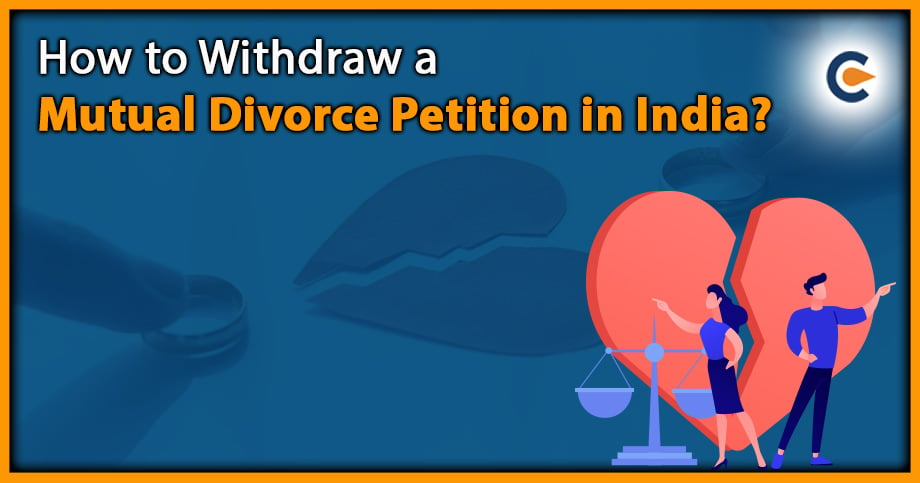There are personal laws which govern matters related to divorce between people belonging to the Hindu religion. The parties to the marriage can apply for seeking a mutual divorce by filing a divorce petition to the District Court. The provision related to mutual divorce for parties belonging to the Hindu religion has been mentioned in The Hindu Marriage Act under Section 13B. After a joint petition has been filed, the court scrutinizes the petition and passes a divorce decree permitting the parties to terminate their wedding.
As per Section 13, parties are mandatorily required to wait for at least 6 months after filing and presenting the joint petition for divorce. They are given a period of 18 months to decide and take a step forward to the court for the passing of a divorce decree. For people not belonging to Hindu religion can follow the provisions stated under the Special Marriage Act[1]. Section 28 of the said Act has similar provisions for mutual divorce. It contains conditions for the parties to apply for mutual divorce.
Grounds for Mutual Divorce
For filing a joint petition for divorce, the parties need to have grounds on which such a petition for mutual divorce can be filed. The grounds have been mentioned below:
- Both parties to a marriage are required to bring the petition together before the court.
- The parties are required to file a motion to the court before the hearing begins.
- For seeking a divorce, the parties must live apart for a minimum period of one year.
- Parties to a marriage are not able to cohabitate together at a place.
- That the parties have decided mutually to dissolve their marriage.
- The parties are required to wait for a time period of 6 months after the divorce petition has been filed before the court.
- From the date when the petition was filed, the parties are required to approach the court by filing an application for getting a divorce decree passed before the expiry of 18 months.
- It is mandatory for the court to ensure that the consent of the party is free from any coercion, fraud or undue influence.
Can Consent Be Withdrawn In Mutual Consent Divorce?
There might be a situation where either party to a marriage changes his/her mind and wishes to save the marriage. In such situations, such a party can file an application before the court stating their intention of withdrawing the permission for divorce as he/she is willing to give a second chance to the marriage. The court where the application is being made by the party must be the same court where the divorce petition is pending for passing of decree.
In case both the parties to a divorce petition agree on amicably withdrawing the petition, then such a court can dismiss the divorce petition.
What If Only One Party Withdraws The Petition For Divorce And What Remedy Is Available To The Other Party?
If a party to the petition submits an application before the court stating his/her intention to withdraw the petition for divorce by mutual consent, then the respective court will not pass any decree for permitting divorce. Either party has the right to do so during the first six months when the petition is pending in court.
After analyzing the application made by the party for withdrawal of the petition, if the court finds out that the application is not genuine, the court will not consider such an application and pass a decree for divorce.
Is It Possible For The Parties To Withdraw Their Consent After The Application For Mutual Divorce Has Been Filed?
There have been certain landmark judgements where the court has considered the application for withdrawal. These are:
- In the case of Jayashree Ramesh Londhe v Ramesh Bhikaji, the Hon’ble court held that the parties to a divorce petition are not allowed to withdraw from such petition unless both parties are willing to withdraw their consent.
- The court in the case of Nachhattar Singh v Harcharan Kaur held that once all the conditions of Section 13B have been duly fulfilled and the parties have filed a mutual divorce petition, then such parties are not allowed to revoke their consent.
- The court held that mutual consent of both parties to a mutual consent must be present until the divorce decree is passed. The time period of 6 months when the petition is pending before the court is given to the parties to re-think their decision of seeking a divorce. It is not necessary for both parties to withdraw their consent. Either party to the petition can do so. This was observed in the case of Sureshta Devi vs. Om Prakash.
- Later, the court held that mutual consent needs to be present until the decree for divorce is passed even if one of the party does not withdraw his/her consent till the time period of 18 months gets completed in the case of Ashok Hurra v Rupa Zaveri.
- The Hon’ble Supreme Court in the case of Anil Kumar Jain vs. Maya Jain held that the mutual consent for divorce should remain until the decree for divorce has been passed. Also, the court has the authority to exercise its power given under Article 142 of the Indian Constitution to ensure that justice has been provided to the parties to divorce.
- In the case where the husband to a divorce petition did not appear before the court after the filing of the divorce petition. Then the court assumed that the husband did not have any intentions of withdrawing his consent and mere silence was not considered as withdrawal of consent. Thus, the court passed a decree assuming that neither party revoked his/her consent for mutual divorce. This was held in the case of Suman vs. Surendra Kumar.
If the party who is intending to withdraw his/her consent from such mutual divorce, he/she needs to inform the court mandatorily by making an application either by himself/herself or through the respective advocate appointed by such party. If such a party who is willing does not do so, the court will stay under an impression that the divorce proceedings should continue and no party is willing to withdraw his/her consent from such mutual divorce.
Conclusion
Parties to a marriage who willingly enter into a mutual agreement and consent to terminate their marriage save a lot of time and money. It is also the simplest form of divorce which involves less time and money as compared to the time, money and stress to the parties during a contested divorce.
It is a much easier and less complex method for divorce. The parties are provided with a time limit of 6 months when the petition is pending before the court so that if any of the party or both parties considers withdrawing the consent to seek a divorce can do so by filing an application in the court where the application is pending. Thus, in such cases where a single party has withdrawn his/her consent, then such a person is left with an option to file an application before the court for a contested divorce.
Also Read:
How To Give Divorce Notice To Wife?











